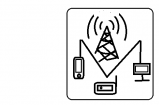The Importance of Cisco CCNA Training
CCNA training has become the most sought after accreditation in the IT field for those looking for a career in computer networks and systems.
Many outside of the IT field will not have heard of the CCNA training. Those who do know anything about building a career in IT see it as the most important course for those starting out in the field.
Why is CCNA training important?
Anyone who is CCNA trained can move into array of IT based positions such as:
• IT help desk
• Field Technicians
• Network Professionals
• Any other job related to networking computers
What does CCNA training stand for?
CCNA is the abbreviation for Cisco Certified Network Associate. An accredited Cisco Certified Network Associate is someone who has gained the entry level certification for computer systems and networks.
Essentially CCNA training stands for knowledge and excellence at an entry level in the IT world of networks.
What will someone accredited with CCNA certification know?
Someone who has completed and passed CCNA training will have the knowledge to set up all manner of home and business networks.
This can mean something as simple as setting up a network through a router utilizing bridges and routing protocols, it can also mean more intricate and technical network systems too.
The Open Systems Interconnection model (OSI for short) is a pivotal and important part of the training as it ensures that those being trained understand the international standardized system of networking such as:
• Application
• Presentation
• Session
• Transport
• Network
• Data link
• Physical
For the uninitiated this means nothing, but for those who are CCNA trained it plays an important part of the networking business.
Further to this a CCNA certified IT professional would know how to build LAN (local area network) and WAN (wide-area network) from scratch, this means actually designing and then building the networks. For local area networks they will also have the knowledge of Ethernet technologies in theory and in practice.
Other parts of the training include understanding all manner of protocols such as BOOTP, TCP, ARP, RARP and ICMP.
Where can IT professionals go for CCNA training?
The CCNA Certification is the first step for many Cisco certification paths, including CCNA Security, CCNA Voice, CCNA Wireless, and CCNP. Once the Cisco Certified Network Associate certification has been achieved there are advanced CCNA courses specializing in specific areas of networking from security and routing to voice and wireless.
There are a host of other Cisco Certified training courses where IT professionals can look to specialize further in particular areas of networking. These courses are as follows:
• Cisco Certified Network Professional (CCNP)
• Cisco Certified Security Professional (CCSP)
• Cisco Certified Internetwork Professional (CCIP)
• Cisco Certified Voice Professional (CCVP)
• Cisco Certified Network Professional Wireless (CCNP Wireless)



